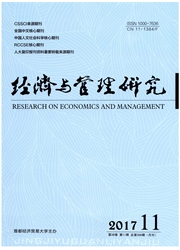

 中文摘要:
中文摘要:
伴随中国经济的持续较快发展与人均收入水平的不断提高,收入不平等问题近年来备受社会各界的关切。鉴于税制结构变迁与收入不平等之间的关系在理论界仍未形成共识,本文首先从理论层面剖析了商品税和所得税对收入不平等的作用机理,然后在对中国1998—2013年城乡居民收入基尼系数进行测度的基础上,通过建立静态与动态面板数据模型实证考察中国税制结构变迁对收入不平等的影响。研究发现:一是虽然所得税能显著降低城乡居民收入不平等,但企业所得税却相比个人所得税更为有效;二是商品税在一定程度上助推了城乡居民收入不平等,具有较为明显的累退性;三是经济发展水平、对外开放程度、人口结构以及人力资本对收入不平等的影响不尽相同;四是收入不平等在中国具有显著的递延惯性。本文的研究结论为中国新一轮税制改革以及税制结构优化具有重要的指导意义。
 英文摘要:
英文摘要:
With the sustainable development of economy and the increase of the per capita income level in China, the problem of income inequality has been widely concerned. However, scholars have not reached a consensus on the relationship between the change of tax structure and the inequality of income in theory. Thus, this paper evaluates the impact of taxation on income inequality in theory,and then analyses the balanced provincial panel data of Chinese urban and rural residents' Gini coefficient from 1998 to 2013. By building static and dynamic panel data models, this paper focuses on the potential role that taxation plays in affecting income inequality. The results show that:the progressive income tax system can reduce the degree of income inequality, but the corporate income tax is more effective than the personal income tax in reducing the degree of inequality;the regressivity of taxes on goods and services has a negative impact on income distribution;the influence of economic development, openness, population structure and human capital on income inequality differs from each other; and income inequality has obvious deferred inertia in China. The conclusion of this paper has reference value in promoting the construction of the modern tax system.
 同期刊论文项目
同期刊论文项目
 同项目期刊论文
同项目期刊论文
 期刊信息
期刊信息
